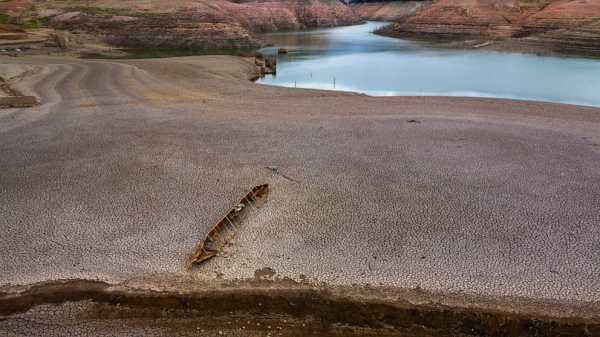
BARCELONA, Spain — Authorities in Spain’s parched northeast warned Tuesday that Barcelona and a wide surrounding area that's home to some 6 million people could face even tighter restrictions of water use in the coming months.
Samuel Reyes, head of Catalonia’s Water Agency that manages water resources for the area encompassing Barcelona and other smaller cities in Spain’s northeastern corner, said the area would likely be declared in a “drought emergency” by September unless forecasts for scant rain prove incorrect.
“Unless it rains in the spring and summer, there won’t be any increases in the reservoirs and we will enter a stage of emergency for the Llobregat river system sometime around September,” Reyes said.
The Ter-Llobregat river system provides the main water supply for Barcelona, Girona and other smaller towns and villages. Spain’s government said Tuesday that its reservoirs, along with others in northern Catalonia, have shrunk to 27% of capacity. Only the reservoirs connected to the Guadalquivir river basin in southern Andalusia are worse off, at 26% of capacity.
Reyes said many of Catalonia’s rivers are at historic lows after a drought that has broken all records for the region and forced authorities to start limiting water use for agriculture and industry last year. Town halls have also been asked to stop filling public fountains, and limits on other uses are in place. There is an open debate now about whether or not to fill swimming pools in the summer, with many cities saying they are ideal “climate shelters.”
In an extraordinary effort to save every last drop of water, authorities successfully moved some 13 cubic hectometers of water from Catalonia's Sau reservoir in recent weeks. In order to ensure the quality of water and avoid a massive die-off of fish, authorities culled 4,000 fish belonging to invasive species. Reyes' agency said on Tuesday that that process had concluded.
Sau is now one of three reservoirs that Catalonia’s firefighters have said they will no longer be able to use to reload water to fight wildfires. Most of Spain is bracing for a difficult wildfire season with forests dry and temperatures expected to remain high after a record-hot 2022.
“Drought has become the principle concern of this country,” said Patrícia Plaja, spokeswoman for the Catalan government.
Under current restrictions, Catalonia's cities are limited to using 230 liters of water per person per day, including personal use as well as what the town hall uses per inhabitant for services like street cleaning. That would drop to 200 liters per day under the “emergency” phase of Catalonia’s drought plan. The water agency says that the average person consumes some 116 liters per day for domestic use.
Catalonia’s government is proposing regional legislation that would allow it to impose fines on cities that use too much water.
Catalonia faced a severe drought in 2008 and used tankers to ship in water for Barcelona. Reyes told The Associated Press recently that his agency would not recommend for that method to be used again, nor would it back a possible rerouting of water from the much larger basin of the Ebro river in Catalonia's south.
___
Follow AP’s climate and environment coverage at https://apnews.com/hub/climate-and-environment
Sourse: abcnews.go.com






